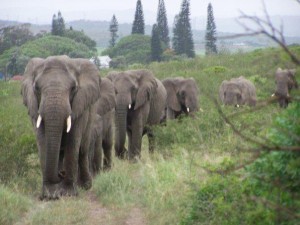When elephants grieve
 In 1998, prize-winning conservationist Lawrence Anthony purchased 5,000 acres of pristine bush known as Thula Thula in the heart of Zululand, South Africa.
In 1998, prize-winning conservationist Lawrence Anthony purchased 5,000 acres of pristine bush known as Thula Thula in the heart of Zululand, South Africa.
He then transformed what had been a run-down 19th Century hunters’ camp into a wild animal preserve and a center for eco-tourism.
In 1999, he was asked to take in a herd of “rogue” elephants from another game reserve. These wild elephants were going to be shot if another home was not found for them!
Knowing he was their last hope, and against all odds of success, Anthony took them in.
The story of how Anthony rescued and rehabilitated the elephants by winning their trust, becoming their friend, and learning to communicate with them is described in his best-selling book, The Elephant Whisperer: My Life with the Herd in the African Wild
But the most remarkable part of his story may be what happened after Anthony died.
Anthony passed away suddenly from a heart attack in March 2012. Two days after he died, 31 elephants showed up at his house to say goodbye to their good friend.
They had walked over 112 miles in single file to arrive at his South African home.
The elephants had not been to his house in a year and a half, but it was clear they knew where they were going. They stayed for two days and nights at his rural compound within Thula Thula without eating anything.
That is the way elephants grieve and express mourning for one of their own: standing vigil and showing quiet respect.
Then, after two days, they left, making their long journey back home.
How did they know?
How did these elephants, grazing miles away in distant parts of the park, know Anthony had died?
Because their hearts were connected to his heart, which had stopped beating on the day he died.
Native Americans teach that humans used to be able to talk to the animals. Clearly Lawrence Anthony re-established that connection through patience and compassion.
Rabbi Leila Gal Berner, Ph.D. had this to say:
“A good man died suddenly, and from miles and miles away, two herds of elephants, sensing that they had lost a beloved human friend, moved in a solemn, almost ‘funereal’ procession to make a call on the bereaved family at the deceased man’s home.
“If there ever were a time when we can truly sense the wondrous ‘interconnectedness of all beings,’ it is when we reflect on the elephants of Thula Thula.
“A man’s heart’s stops, and hundreds of elephants’ hearts are grieving.
“This man’s oh-so-abundantly loving heart offered healing to these elephants, and now, they came to pay loving homage to their friend.”
Lawrence Anthony was the kind of human who makes the world better for everyone in it, humans and animals alike.
How can we do the same?
- Support animal welfare organizations
- Support land conservancies so that wildlife can continue living in their natural habitat
- Boycott circuses that display live animals such as elephants; they did not choose to be there. Circus training for animals involves cruelty and is modern day slavery. Enough said.
- Boycott meat that comes from confined animal feeding operation. More animal cruelty.
- Support ONLY those zoos which rescue and rehabilitate animals. In this day of modern media, we don’t need to see a live tiger in a prison. We can watch films to learn about them, and that’s much better for the animals.
We are all in this together; and together we can make the kind of difference Lawrence Anthony did in the lives of South African elephants.
[quote]Perhaps the most important lesson I learned is that there are no walls between humans and the elephants except those that we put up ourselves, and that until we allow not only elephants, but all living creatures their place in the sun, we can never be whole ourselves.[/quote] Lawrence Anthony
Molly Larkin is the co-author of the international best-seller “The Wind Is My Mother; The Life and Teachings of a Native American Shaman” and other books on health. She is passionate about helping people live life to their fullest potential through her classes, healing practice and blog at www.MollyLarkin.com

